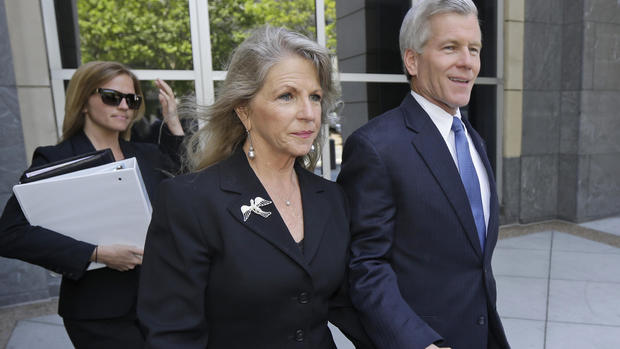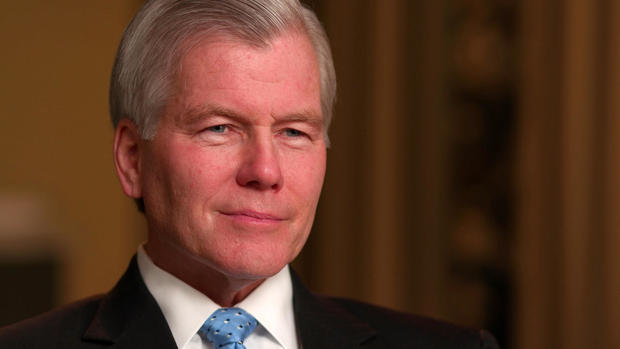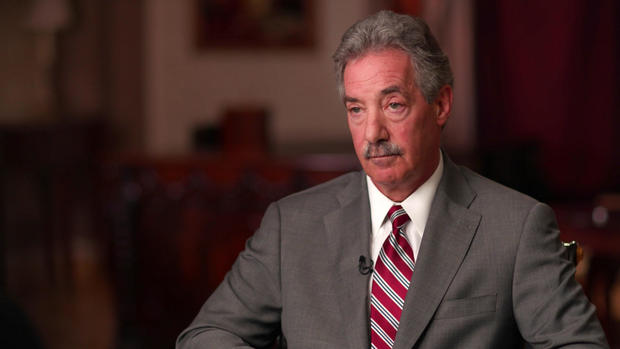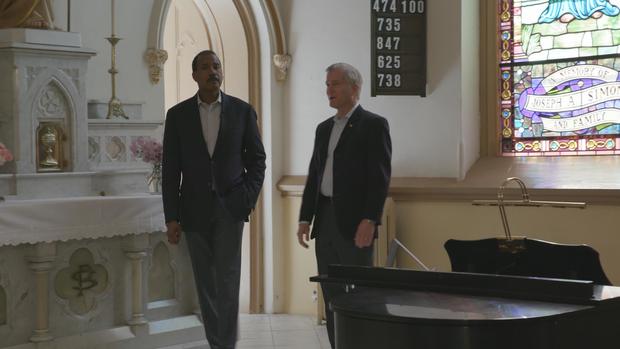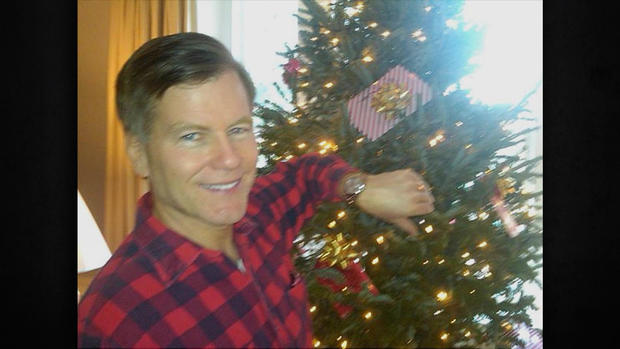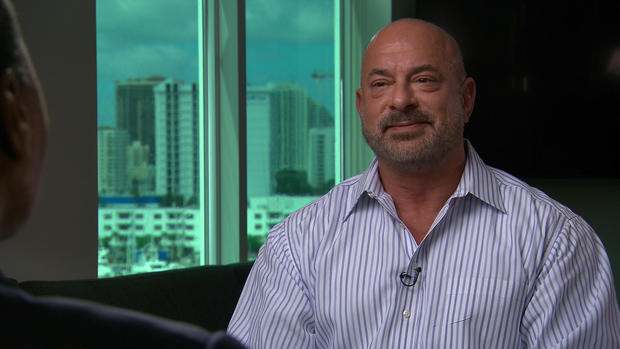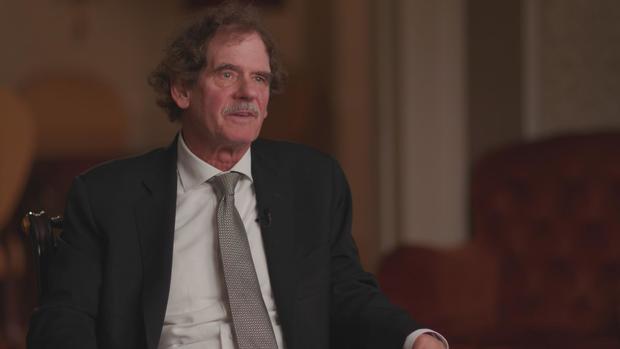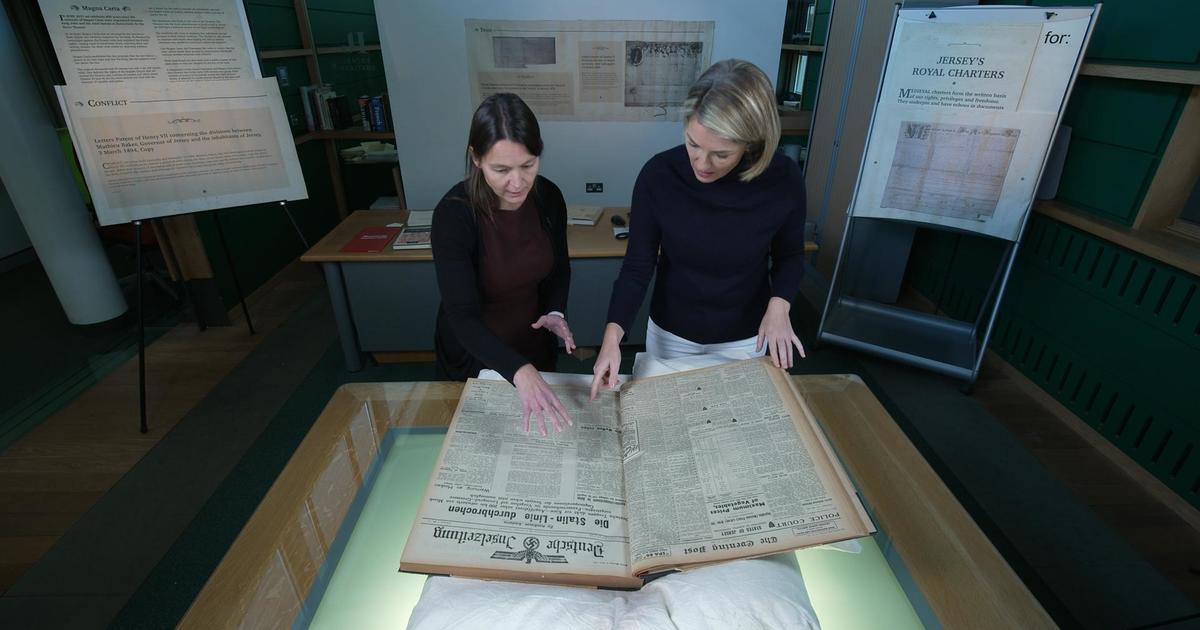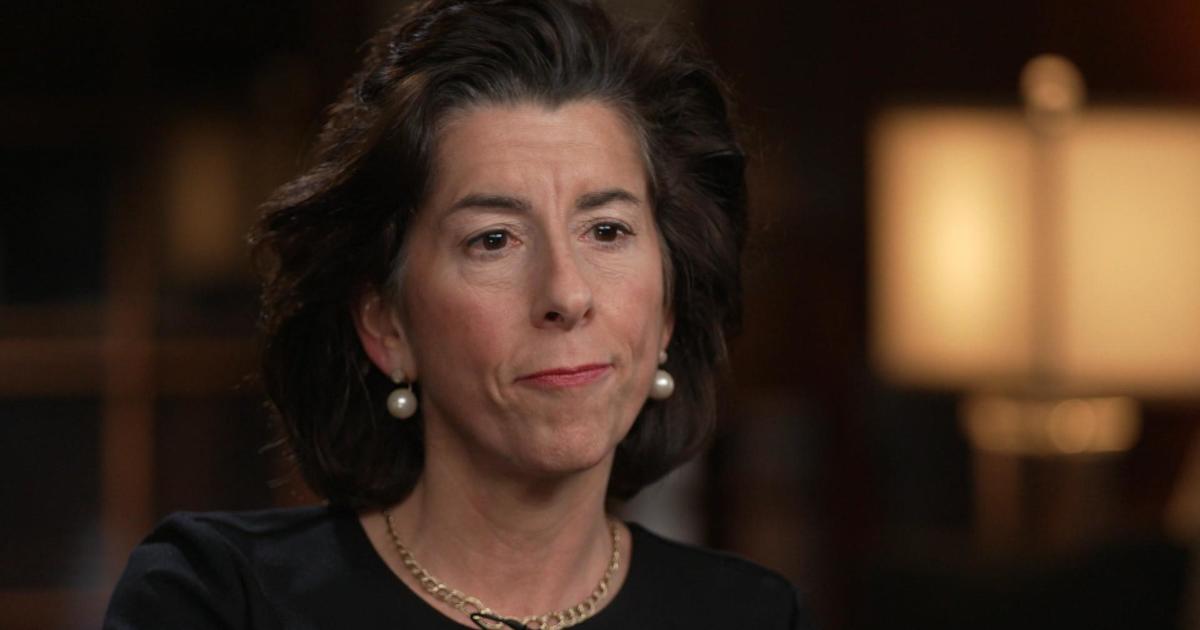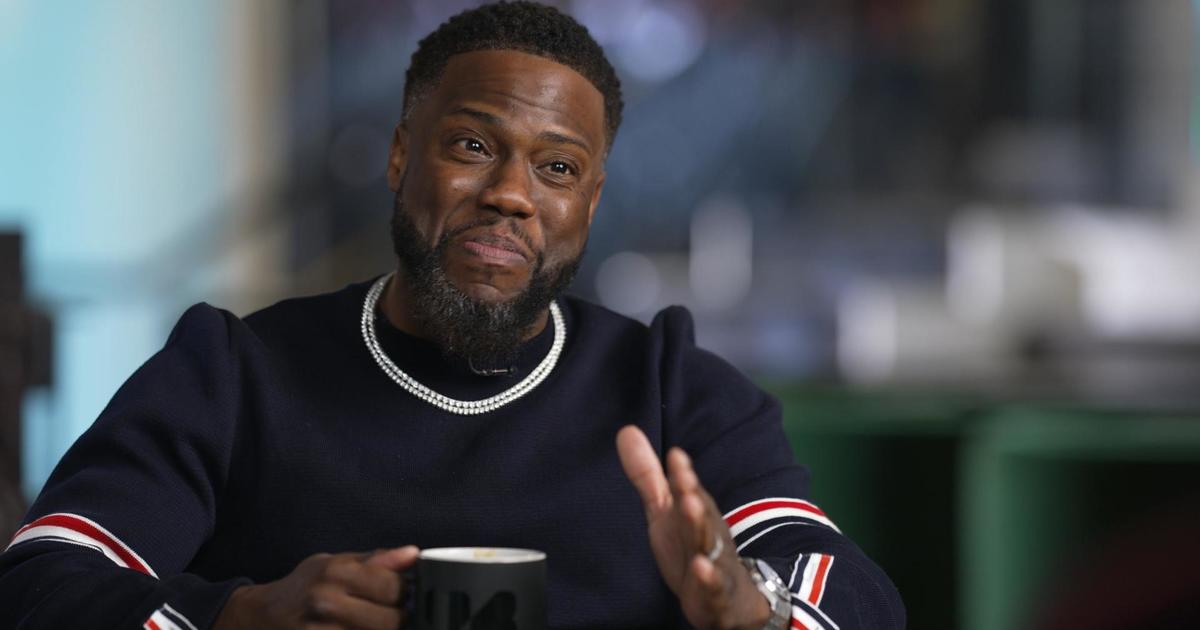Ex-Governor Bob McDonnell on SCOTUS overturning his conviction
- Last year, in a unanimous decision, the Supreme Court vacated Bob McDonnell's conviction, but condemned his conduct on ethical grounds.
- McDonnell and his family accepted $177K in gifts and loans while he was in office. His attorney admitted the evidence looked bad, but that's just the way U.S. politics works.
- Now, politicians found guilty of bribery in New York, Pennsylvania and Louisiana are using the McDonnell case to fight their own convictions.
In the wake of last fall's elections, we've heard lots of talk of draining the swamp, of corruption and influence peddling, but amid all the heated discourse, you might have missed an important political story that is reverberating across the country and that we first reported in April.
"I listened to 19 guilty verdicts for my wife and me. And all I could do was sob." Bob McDonnell
It's the case of former Virginia Governor Bob McDonnell, who was an up-and-coming Republican star with a squeaky clean image and a record of promoting job growth. But his political career exploded in scandal worthy of a soap opera when he was convicted of public corruption and sentenced to two years in federal prison. He fought the charges all the way to the United States Supreme Court -- wracking up a hefty legal bill of $27 million. It turned out to be worth it. The Supreme Court reversed his conviction in a controversial and far-reaching ruling – but not without a hitch. Chief Justice John Roberts described the case as "tawdry tales."
Tonight, looking no worse for wear, Bob McDonnell, talks about the case and the moment his world came crashing down when a Richmond jury returned a verdict against him.
Bob McDonnell: I listened to 19 guilty verdicts for my wife and me. And all I could do was sob.
Bill Whitaker: You broke down?
Bob McDonnell: Ah. That's all I could do, Bill. At that point, I was a convicted felon with a criminal record who was going to lose my law license, my right to vote, my passport, my reputation and other liberties. And my life was never going to quite be the same.
Bob McDonnell was one of the most popular Virginia governors in recent history. In 2012, he made the short list of Mitt Romney's possible running mates. But in a stunning fall from grace, in 2014, just 10 days after leaving office, McDonnell and his wife Maureen were indicted, then convicted by a jury of conspiracy and bribery. They had accepted $177,000 from a local businessman in personal loans and gifts presented as evidence in court: golf bags and clubs, luxury family vacations, the use of a Ferrari, $20,000 of designer clothes for Maureen and a Rolex watch for the governor. McDonnell appealed his guilty verdict up to the Federal Court of Appeals – and lost twice. But then his conviction was reversed by the U.S. Supreme Court last fall.
Bob McDonnell: The worst at all was the-- the-- the belief that much of the public, and much of the nation looked at this, and think, "There's another corrupt politician."
Bill Whitaker: And if I'm one of your citizens sitting at home in Virginia, and I see you, my governor, getting this money, these loans, these gifts, these trips, I'm-- I'm-- I'm wondering how you justify that. I mean, these things would not have come to you were you not the governor.
Bob McDonnell: That's probably right.
Bill Whitaker: How do you tell the guy, the coalminer sitting in western Virginia that that's OK?
Bob McDonnell: You know, I had to make those judgments, you know, kinda one thing at a time.
Bill Whitaker: And none of that set off alarm bells?
Bob McDonnell: It didn't, because I knew that it was -- completely legal under Virginia law.
Virginia at the time had no limits on gifts to state officials. But McDonnell's case stands out because he took so much from one person -- this man, multi-millionaire Jonnie Williams. Williams wanted the governor's help getting state-sponsored studies of his new tobacco-based supplement called Anatabloc. He claimed it had healing powers. Williams declined to talk to us, but in court he testified under immunity for the prosecution, that he was 100 percent sure he and the governor had an agreement: money and gifts for political favors.
Bob McDonnell: I considered him an entrepreneur. He had the opportunity to create jobs for Virginians.
Bill Whitaker: He plied you, and your wife, with huge sums of money, and gifts. He says that he did it, because he wanted to influence you. What did you think he wanted?
Bob McDonnell: He asked to meet with staff people. I referred him to meetings. My job was just to connect people with government and I considered it a routine part of what I did-- for job creation, and just regular constituent service.
Bill Whitaker: Is that what it takes to get the attention of you guys, somebody coughing up that kind of money?
Bob McDonnell: No.
"Here is somebody who took over $170,000 to do things that he could only do because he was the governor of the state." Jim Cole
Bill Whitaker: But explain to me where that's-- where I'm-- I'm wrong in seeing ... as--
Bob McDonnell: That is an everyday action in America and I know it to be true from years in politics.
But it wasn't politics as usual to Jim Cole. He was the deputy attorney general who oversaw the McDonnells' prosecution.
Jim Cole: He used his office for personal gain.
Bill Whitaker: The governor says all he did was make introductions.
Jim Cole: Here is somebody who took over $170,000 to do things that he could only do because he was the governor of the state.
The McDonnells actively promoted Anatabloc and invited Jonnie Williams to events at the governor's mansion with health care leaders and researchers who could help him.
Bob McDonnell: There was never a quid pro quo, or any conspiracy, or any agreement to help Mr. Williams. And ultimately the Supreme Court of the United States said that government advanced essentially a dangerous legal theory that had serious constitutional problems.
"At the end of the day, the United States Supreme Court said that this was the routine stuff that governors do." Bob McDonnell
Bill Whitaker: What do you mean dangerous? Why dangerous?
Bob McDonnell: Because it criminalizes routine political conduct, things that happen in this country every day.
The justices did unanimously reverse his conviction – they faulted federal prosecutors for overreaching with a definition of corruption that was too broad and ruled that merely "setting up a meeting" or "hosting an event" for Jonnie Williams did not constitute a crime. But they condemned McDonnell's conduct on ethical grounds. In his opinion, Chief Justice John Roberts wrote the "tawdry tales of Ferraris, Rolexes, and ball gowns" did not "typify normal political interaction…far from it." In our interview, McDonnell chose to focus on the positive.
Bob McDonnell: At the end of the day, the United States Supreme Court said that this was the routine stuff that governors do. And we may not like the amount of gifts, but it was consistent with Virginia law and so, Bill, that's why at this point, I feel vindicated.
Bill Whitaker: Vindicated? That's not my reading of the Supreme Court decision. Chief Justice Roberts said himself, and this is a quote from his opinion, "There is no doubt that this case is distasteful. It may be worse than that." So this wasn't an exoneration. They looked at what you did, and called it tawdry.
Bob McDonnell: Well, I would disagree with that. You've-- you've picked two sentences out of a 28-page opinion. But the import of that opinion, Bill, is not the language that you've read. It's the other 99% of the opinion.
Bill Whitaker: But what I hear you saying is that, "I will accept 99 percent of what the Supreme Court justices said, but that one percent that sort of slaps my wrist…
Bob McDonnell: No!
Bill Whitaker: …I'm not -- That, they got wrong."
Bob McDonnell: No, I'm not saying that. I accept that.
Bill Whitaker: They found that your behavior was not something that they sanctioned.
Bob McDonnell: You know, the words are what the words are. I accept 100 percent of the opinion. And so, you know-- with my own conscience that's really between I guess me and God about how I did.
Bob McDonnell ran for office on a campaign of faith and family values. But when the scandal broke, apparently so did the McDonnells. The alleged husband and wife conspirators started coming to court separately. And Bob McDonnell moved here into the rectory of his church.
Bill Whitaker: You were in church yesterday. And you were telling me you were a moral man.
Bob McDonnell: I try to be, Bill.
Bill Whitaker: Did this meet your moral code?
Bob McDonnell: If I do it over again, I was governor, I wouldn't take any gifts. I didn't need 'em.
Bill Whitaker: So why'd you take 'em?
Bob McDonnell: You know, having a family vacation after working 15 hours a day at a nice lake resort with my family, you know, I appreciated that.
Bill Whitaker: But you're a public official.
Bob McDonnell: Yes.
Bill Whitaker: I think the public believes that you should reach a higher standard.
Bob McDonnell: I knew in my heart I was governing myself properly. And I knew I was making all the appropriate disclosures.
Virginia law didn't require disclosure of gifts to family members. So, he didn't report this $50,000 personal loan from Williams to a company McDonnell owned with his sister -- or most of the gifts, including the $6,500 Rolex watch Jonnie Williams gave to Maureen to give to the governor.
"I didn't know what a Rolex cost to be honest. I'm a Seiko and Timex guy, and always have been." Bob McDonnell
Bill Whitaker: Tell me about the Rolex. I've seen the picture. You're holding the Rolex up. You're smiling.
Bob McDonnell: My wife gave it to me for Christmas in 2012. With all my heart, I believed it was from her. She told me it was from her.
Bill Whitaker: You were telling us that you needed loans, business loans. Didn't -- didn't you wonder -- "How did my wife afford a Rolex?"
Bob McDonnell: Bill, I didn't know what a Rolex cost to be honest. I'm a Seiko and Timex guy, and always have been.
But Maureen McDonnell, a former Redskins cheerleader who brought her pom poms to her husband's inauguration, had a taste for the finer things. On a shopping spree in New York with Jonnie Williams, he bought her $20,000 worth of designer clothing and accessories. Maureen McDonnell declined to speak with us. But Bob McDonnell, who went with her to New York, told us he didn't notice what she bought and didn't ask questions.
Bill Whitaker: If my wife came in with, what was it $20,000 worth of clothing, I would notice the bags, and the boxes. I would say, honey, where'd you get all of this?
Bob McDonnell: I knew she had bags. I knew she shopped. Who paid for those was just not something that we discussed. I'm just not the kind of person that probably paid enough attention on some of those things.
His inattention to his wife became key to his defense strategy. In court, with his liberty at stake, McDonnell allowed his defense team to point the finger at his wife of more than 35 years and tell the jury she was the one taking most of the gifts and, without his knowledge, helping businessman Jonnie Williams.
If McDonnell wasn't paying attention, the governor's chef, Todd Schneider was. He told us Jonnie Williams was a regular at the mansion.
Todd Schneider: Remember, everybody talks in the kitchen.
Bill Whitaker: And what were people saying?
Todd Schneider: What we thought of everything that they did, shady. Why is this guy trying to get in here so much the clothes and the gifts and the other things. You, kind of, knew what was going on.
Bill Whitaker: What was going on?
Todd Schneider: Jonnie Williams was trying to get his medicine approved and Bob McDonnell and Maureen McDonnell were getting their bills paid.
There is bad blood between Schneider and McDonnell. After the governor fired him in an unrelated payment dispute that ended up in court, Todd Schneider turned over key evidence to the FBI -- a $15,000 check for catering McDonnell's daughter's wedding. It came from Jonnie Williams' account, Starwood Trust. That triggered the investigation of Bob McDonnell and the federal case under former Deputy Attorney General Jim Cole.
"You wanna take the money outta politics, then take it outta politics. But this is not unique to Bob." Hank Asbill
Jim Cole: These were not gifts. These were payoffs.
Bill Whitaker: People are giving money all the time. People make contributions.
Jim Cole: The key difference here is that the contributions didn't go to a campaign. The money that came in went into his pocket. That's not normal politics, that doesn't happen every day.
Hank Asbill: You wanna take the money outta politics, then take it outta politics. But this is not unique to Bob.
McDonnell's attorney Hank Asbill admitted the evidence in the case looked bad, but he said, it's just the way American politics works.
Hank Asbill: You know, would anyone look at the gifts and loans in this case and say it's a good idea? No. I wasn't happy about having to defend it, but there was no crime.
Bill Whitaker: But shouldn't we expect our politicians to have a higher standard?
Hank Asbill: Maybe so. And there oughta be a better way of reforming politics in America as usual -- than going after my client and accusing him of committing a crime which he didn't commit.
Bill Whitaker: What do you think the effect of this Supreme Court decision will be on American politics?
Jim Cole: It gives much greater room for public officials to commit improper acts, to commit bribery in subtle ways, and it gives them that room to do it without worrying about getting prosecuted.
The Supreme Court ruling is shaking things up already. Politicians found guilty of bribery in New York, Pennsylvania and Louisiana are now using the McDonnell case to fight their convictions.
Produced by Sarah Koch and Evie Salomon. Andrea Hilbert and LaCrai Mitchell, associate producers.
